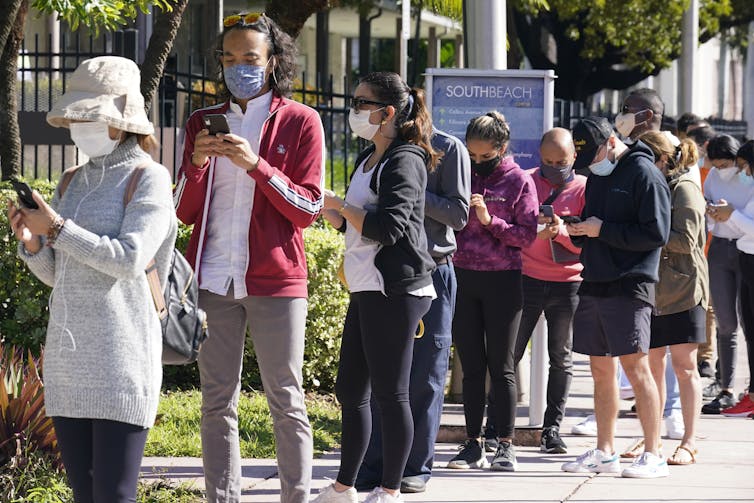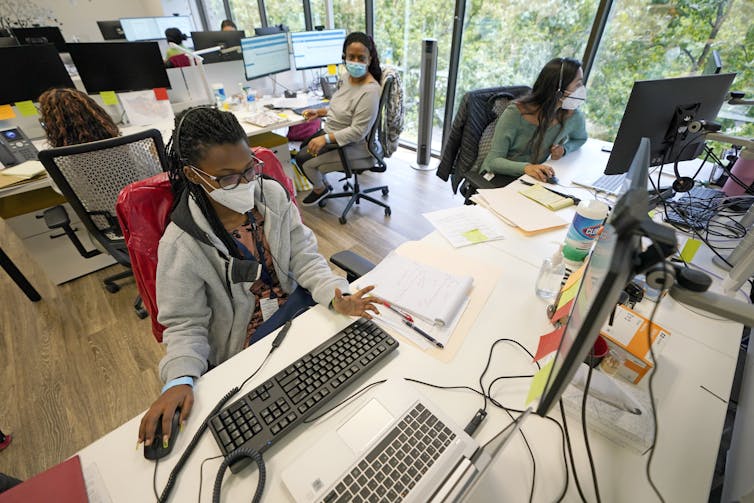New DIY contact tracing app expands the fight against COVID-19, using the science of memory
- Written by Jacqueline R. Evans, Associate Professor of Psychology, Florida International University
Imagine you begin to feel ill on Thursday, a few days after returning from a trip. You’re afraid it’s COVID-19, so you get tested on Friday. Even under good circumstances, it will probably be at least Monday before a contact tracer calls from the health department. And then some phone tag may ensue before you speak with anyone – if you get a call at all[1].
Once a contact tracer does reach you, you will be asked to remember all the people you were in close contact with, starting two days before you began feeling symptoms. That means recalling all the places you went and the people you saw over the past week.
It isn’t easy. As time passes, memories fade. Unfortunately, your contacts, unaware they were exposed to the coronavirus, may have already infected others.
Concerned about those delays, three of us and our colleague Ronald Fisher[2], all psychology[3] professors[4] with expertise in memory[5], developed a way for people who have been exposed to COVID-19 to effectively trace their recent contacts on their own.
Self-driven contact tracing shouldn’t replace health department efforts. Professional teams of trained contact tracers are critical for locating the people you came in contact with but don’t know, such as at a restaurant or on an airplane, and then tracing the next ring of contacts. However, jump-starting the effort on your own can improve your chances of remembering and allow you to warn your contacts sooner.
Notifying contacts faster
Contact tracing, along with testing and isolating people who are infected, is considered crucial for controlling the coronavirus’s spread until a vaccine becomes widely available.
Health department contact tracers try to notify and interview anyone who was within 6 feet of an infected person for a total of 15 minutes or more[6]. Studies show that, to be effective, that notification needs to happen within a few days[7] of the person’s symptoms appearing. But case numbers have gotten so high, it’s become impossible for many states and counties to keep up. Some, including in Alaska[8], Missouri[9] and Wisconsin[10], have urged residents to start notifying contacts on their own.
 The time spent waiting in line for COVID-19 testing could be used to start your own contact tracing.
AP Photo/Marta Lavandier[11]
The time spent waiting in line for COVID-19 testing could be used to start your own contact tracing.
AP Photo/Marta Lavandier[11]
We created CogTracer[12] as a free online tool to help people start tracing those contacts using best-practice interviewing methods[13].
With DIY contact tracing, the timetable changes. For example, while you’re waiting for your test, you can be given the link to the website and start walking yourself through a contact tracing interview.
[The Conversation’s most important coronavirus headlines, weekly in a new science newsletter[14].]
How psychology can help jog your memory
CogTracer[15] uses prompts, in words and photos, to spark your memory for as many contacts and locations visited as possible. It urges you to look back at places that might have evidence of your movements that week, such as social media posts and credit card records, and it provides scientifically supported interviewing techniques to reduce the chances of forgetting a contact. Research in investigative interviewing shows that people can effectively remember events on their own[16] when they have scientifically supported methods.
One technique for remembering is known as context reinstatement[17]. It involves putting yourself back in a specific time and place.
For example, if you attended a family gathering over the holidays, you might mentally recreate the event. You could think back on how you arrived and departed, what you wore, who was there, what you ate, what you heard and what you saw. The technique encourages closing your eyes during this process to help you concentrate.
“Reliving” this experience should make it easier to remember your close contacts at the event.
 Counties have hired more contact tracers trained to conduct interviews, but the rising case numbers and amount of time required for each case have overwhelmed them.
AP Photo/David J. Phillip[18]
Counties have hired more contact tracers trained to conduct interviews, but the rising case numbers and amount of time required for each case have overwhelmed them.
AP Photo/David J. Phillip[18]
Another important way to improve memory is varied retrieval[19]. When you search your memory only once, or in the same way over and over, it is likely that something will be forgotten. What you recall depends on how you cue your memory. If you prompt your memory in different ways, you’ll recall different things.
CogTracer takes advantage of repeated and varied recall by including broad category cues, such as “people you interact with in homes” or words such as “babysitter,” that may trigger memories of nonroutine activities that may otherwise be forgotten.
Applying these proven methods should result in more complete recall of those who could be at risk for contracting COVID-19.
Online tools can overcome other barriers, too
This DIY approach can also help overcome other barriers to effective and timely contact tracing.
Because many people put a high premium on privacy, some are resistant to providing information to contact tracers. CogTracer is anonymous and private – you don’t enter any information, and you make your own lists. This provides a way for those who otherwise would not engage in the process to contribute to contact tracing efforts on their own terms. Additionally, non-English speakers may require an interpreter, further delaying the contact tracing process. Online interviews can more quickly bridge these language gaps.
As the pandemic rages, public health workers are engaged in Herculean efforts to fight this disease. By reimagining contact tracing and applying the science of memory, we can leverage the power of individuals to attack the problem from as many fronts as possible.
References
- ^ get a call at all (www.politico.com)
- ^ Ronald Fisher (doi.org)
- ^ psychology (scholar.google.com)
- ^ professors (scholar.google.com)
- ^ expertise in memory (scholar.google.com)
- ^ 6 feet of an infected person for a total of 15 minutes or more (www.cdc.gov)
- ^ within a few days (doi.org)
- ^ Alaska (www.adn.com)
- ^ Missouri (www.kmov.com)
- ^ Wisconsin (www.dhs.wisconsin.gov)
- ^ AP Photo/Marta Lavandier (newsroom.ap.org)
- ^ CogTracer (cogtracer.wixsite.com)
- ^ best-practice interviewing methods (doi.org)
- ^ The Conversation’s most important coronavirus headlines, weekly in a new science newsletter (theconversation.com)
- ^ CogTracer (cogtracer.wixsite.com)
- ^ effectively remember events on their own (doi.org)
- ^ context reinstatement (doi.org)
- ^ AP Photo/David J. Phillip (newsroom.ap.org)
- ^ varied retrieval (doi.org)
Authors: Jacqueline R. Evans, Associate Professor of Psychology, Florida International University

